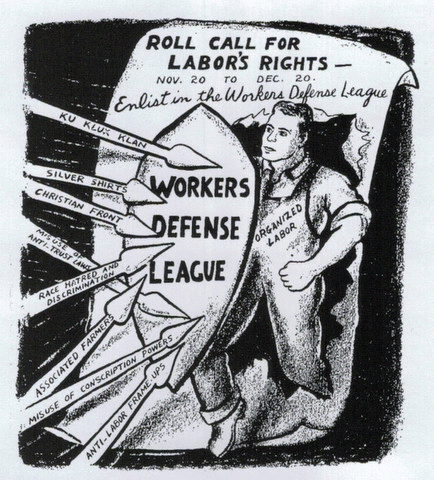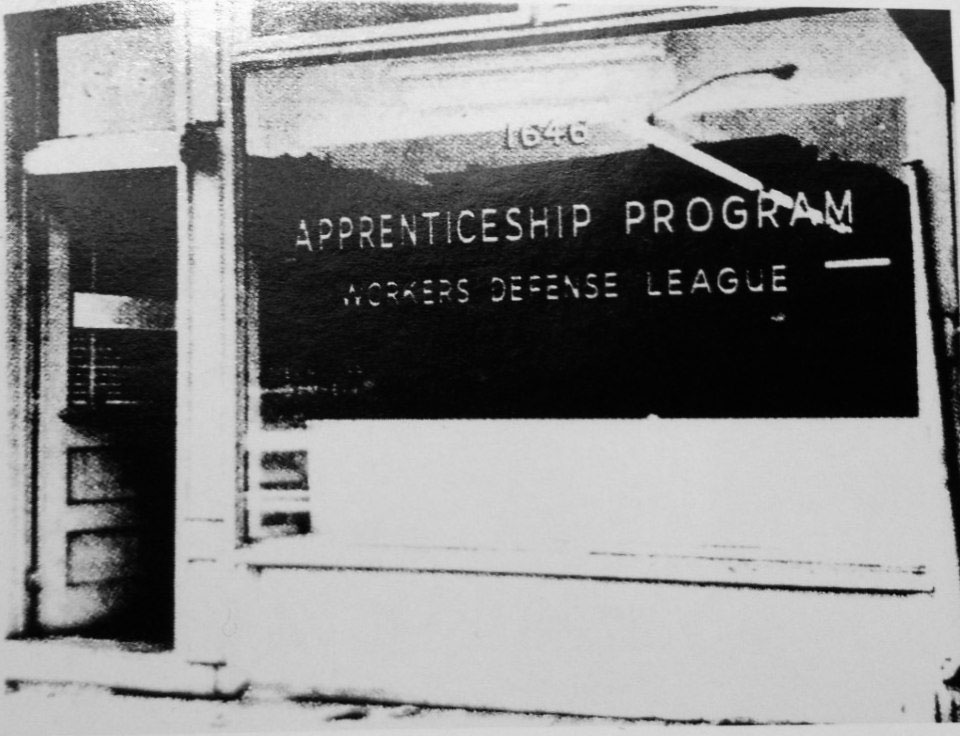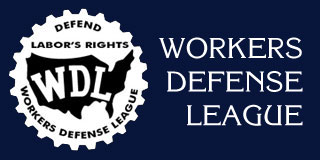Highlights of Our History

WDL promotional campaign, c. 1940
Some years ago, a WDL flyer wryly began, "In 1936, the WDL was founded to deal with the business of injustice. Years later, we can report that business is booming, unfortunately." It would take a book to describe all the campaigns since then. WDL has fought good fights for free speech, decent working conditions, civil rights, and the right to organize. We have defended or found defense for thousands upon thousands of political refugees, draftees, farm workers, and workers of all trades and callings who have asked WDL for help with their workplace problems.
These are just a few highlights of WDL's history...
1936
WDL was founded by Norman Thomas, David L. Clendenin, and others, as a fusion of several ad hoc committees to defend union organizers who were being legally and sometimes physically attacked in Florida, Indiana and elsewhere.
WDL served as the legal arm of the Southern Tenant Farmers Union, an interracial union of sharecroppers and tenant farmers in the South and Southwest.
1937-1938
WDL fought Mayor Frank "I Am the Law" Hague of Jersey City, who banned CIO union supporters. WDLers risked arrest and beatings for leafletting for the CIO in Journal Square in downtown Jersey City. In 1939, in a 5-2 decision, the U.S. Supreme Court ordered Mayor Hague to respect free speech.
1940-1942
WDL came to the defense of Odell Waller, a Virginia sharecropper condemned to death after a one-day trial. Working with Thurgood Marshall of the NAACP, WDL waged a legal and publicity campaign against the poll tax and unrepresentative juries.
1947
Two WDL staff members were among the sixteen people, eight black and eight white, who together bravely took the first Freedom Ride, the "Journey of Reconciliation," through the upper South to test a Supreme Court ruling banning segregation on interstate buses.
1949
WDL organized and convened a Commission of Inquiry into Forced Labor, taking testimony from experts and eyewitnesses about labor camps in the Soviet Union, debt slavery in the American South, and forced labor in South Africa and French colonial Vietnam. WDL was attacked by Pravda as a "tool of Wall Street," and by the Chicago Tribune as "a tool of the Communists"!
1955
WDL National Secretary Rowland Watts' report, The Draftee and Internal Security, led to major changes by the U.S. Army in their procedures concerning "security discharges," which had until then unfairly stigmatized hundreds of soldiers.

WDL Apprenticeship Program storefront office, Brooklyn, NY 1964
1963
WDL initiated an Apprenticeship Training Program, preparing hundreds of minority youth to take the qualifying exams to enter union apprenticeships in the building and construction trades. As a result, hitherto all-white unions admitted their first minority apprentices and journeymen. WDL's program eventually expanded into the Joint Apprenticeship Program and the federally-sponsored Recruitment and Training Program.
1969-1971
WDL successfully defended several soldiers at Fort Dix accused of rioting in protest against overcrowded stockade conditions. For the next five years, WDL's Military Justice project aided scores of Vietnam veterans challenging dishonorable discharges.
1981-1983
WDL launched a new campaign against mistreatment of farm workers on the East Coast, resulting in the passage of a North Carolina law banning debt patronage.
1985
WDL began training non-lawyers how to advocate for unemployed workers denied their unemployment insurance (UI) benefits.
1997
WDL produced a 13-minute video titled Would You Cross A Picket Line?, to be used to reach new generations of workers with an anti-strikebreaking message. The video has been shown on cable television, and copies ordered by union locals, college classes and labor education centers across the U.S. and Canada.
TODAY
WDL receives an average of 125 calls a week from workers with unemployment insurance and other workplace problems. WDL advises and counsels these workers and helps them to find the information and resources they need.
WDL represents approximately 150 UI claimants per year in hearings, winning most cases and thereby helping save many claimants from destitution.
WDL receives calls every day from workers who tell us: "We don't know who to turn to. What are my rights?" As long as WDL is called upon, our work will continue.
